Key (online version)
|
|
1a |
| Postpedicel at least four times as long as pedicel. |
|
2 |
| b |
| Postpedicel at most four times as long as pedicel. |
|
9 |
| |
|
2a |
Frontal index larger than 1,5. Antennae distinctly separated at their bases, the distance between them about the same as the distance between the antennal base and the eye. Hind femur ventral without a field of short hairs.
No European species. |
| Tropeopsila Shatalkin, 1983 |
|
|
| b |
Frontal index less than 1,5. Antennae more closely approximated at their bases. Hind femur ventrally near apex with a field of short hairs.
|
|
3 |
| |
|
3a |
| Frontal vitta sclerotized, (sub)shining; lunule sclerotized and broadly exposed between antennal base and anterior margin of frons (rarely withdrawn in dry specimens) [Fig. 705]. Alula bare except margin. Male pregenital sclerite large and exposed, setulose [Fig. 708](pgs). Female cerci contiguous with tergite 10 but separate [Fig. 706]. |
| Loxocera Meigen, 1803 |
|
4 |
| b |
| Frontal vitta desclerotized, velvety and dull; lunule usually hidden [Fig. 704], at most very narrowly exposed between antennal base and anterior margin of frons. Alula microtrichose. Male pregenital sclerite small and withdrawn, bare. Female cerci completely fused to tergite 10, forming one continuous sclerite [Fig. 706]. |
| Imantimyia Frey, 1925 |
|
6 |
| |
|
4a |
Scape, pedicel and postpedicel all elongate; arista thickened and inserted about halfway the postpedicel ; arista white with yellowish base. Head, thorax and abdomen glossy brownish black but basal abdominal segments rather reddish brown. Legs yellowish brown but femora darker. 10-12 mm.
Loxocera Meigen, 1803 subgenus PlatystylaMacquart, 1835 |
| Loxocera (Platystyla) hoffmannseggi Meigen, 1826 |
|
|
| b |
| Only the postpedicel elongate; arista thickened at base only and inserted near base of postpedicel [Fig. 695] [Fig. 696]. |
| Loxocera Meigen, 1803 sensu stricto |
|
5 |
| |
|
5a |
| Head black, but genae with a small paler marking and frontal vitta yellowish brown. Abdomen black but somewhat brownish laterally. Thorax yellowish brown but scutum blackish anteriorly. Legs yellow. 7-10 mm. |
| Loxocera (Loxocera) aristata (Fanzer, 1801) |
|
|
| b |
| Head black, but genae yellow and frontal vitta yellowish brown. Abdomen blackish but with yellow base and lateral markings. 8-9 mm. |
| Loxocera (Loxocera) maculata Rondani, 1876 |
|
|
| |
|
6a |
| Arista with short hairs, virtually invisible at low magnification [Fig. 696]. Face black medially with yellow lateral parts or entirely black. |
|
7 |
| b |
| Arista with distinct hairs [Fig. 695]. Face entirely yellow. |
|
8 |
| |
|
7a |
| Postpronotal lobes yellow. Frons with frontal vitta black, lateral parts yellow; face black with yellow lateral parts. Genae broader, lower part of vertex and genae yellow. Thorax yellow with dark marking on anterior part of scutum. Abdomen brownish black. Legs yellow. 4-6 mm. |
| Imantimyia sylvatica Meigen, 1826 |
|
|
| b |
Postpronotal lobes dark. Frons entirely black, if not entirely black then not as described for the species above. Face entirely black but lateral parts with narrow strips with silvery pilosity. Genae narrower, lower part of vertex blackish. Abdomen brownish black. Legs yellow. 4-5 mm.
|
| Imantimyia fulviventris Meigen, 1826 |
|
|
| |
|
8a |
Head yellow but frontal vitta and upper part of vertex black. Scutellum yellow. Arista white. Thorax yellowish with postpronotal lobes and anterior part of scutum black. Abdomen black. Legs yellow. Larger species: 7-9 mm.
|
| Imantimyia albiseta (Schrank, 1803) |
|
|
| b |
| Frons and scutellum entirely black. Smaller species: 5-7 mm. |
| Imantimyia nigrifrons (Macquart, 1835) |
|
|
| |
|
9a |
| Height of peristoma less than 1/3 of eye diameter [Fig. 672]. Anal cell (A) distinctly shorter than second basal cell (2B) [Fig. 669]. Vertex flat. Vibrissal area in lateral view angular [Fig. 672]. Males: hypopygium with surstyli. 2-3 pairs of scutellar setae. |
| Chyliza Fallén, 1820 |
|
10 |
| b |
| Height of peristoma larger than 1/3 of eye diameter [Fig. 671]. Anal cell (A) about as long as second basal cell [Fig. 668]. Vertex somewhat convex. Vibrissal area in lateral view rounded. Males: hypopygium without surstyli. |
|
16 |
| |
|
10a |
| Arista with dense black pubescence. |
| Chyliza Fallén, 1820, subgenus Dasyna Robineau-Desvoidy, 1830 |
|
11 |
| b |
| Arista with normal white pubescence. |
|
12 |
| |
|
11a |
| Head completely black; postpedicel more than twice as long as wide. Hind tibia without black area. Body length 5–5.5 mm - Europe, Middle East and Turkmenistan. |
| Chyliza (Dasyna) extenuata (Rossi, 1790) |
|
|
| b |
| Head mainly yellow, only occiput partly black; postpedicel twice as long as wide. Hind tibia with large lateral black area on apical 2/3. Body length 4.5–5 mm - Iran. |
| Chyliza (Dasyna) qaradaghi Khaghaninia & Gharajedaghi, 2014 |
|
|
| |
|
12a |
| Eyes small in relation to head [Fig. 697]. Wings dark, especially darkened along costa [Fig. 699]. Femora typically all predominantly black (on some specimens the black area is reduced on the hind pair). Male genitalia: [Fig. 698]. Often only 2 pairs of bristles on scutellum. |
| Chyliza (Chyliza) leguminicola Melander, 1920 |
|
|
| b |
| Eyes large in relation to head: [Fig. 672]. Wings predominantly hyaline; apex darkened, but the dark area along costa is restricted to at most apical half of the wing. Femora all predominantly yellow. Male genitalia different. 3 pairs of bristles on scutellum (or very rarely 4 pairs). |
|
13 |
| |
|
13a |
| Thorax yellow with brown or blackish brown longitudinal stripes laterally and sometimes dorsally. Back of the head and frons entirely or mostly yellow. Legs yellow (or with brownish sub-apical band on hind femora). |
| Chyliza (Chyliza) vittata Meigen, 1826 |
|
|
| b |
| Thorax black (except humeri and scutellum). Back of the head and frons all or mostly black. |
|
14 |
| |
|
14a |
| Femora yellow with black rings near tip. |
| Chyliza (Chyliza) annulipes Macquart, 1835 |
|
|
| b |
|
|
| |
|
15a |
| Male front tibia with row of small black erect spines [Fig. 700]. Male sternite 6 with central part narrow and with large spines posteriorly [Fig. 702]. Female with pedicel brownish above, and dorsal side of humeri usually entirely black. |
| Chyliza (Chyliza) leptogaster (Panzer, 1798) |
|
|
| b |
| Male front tibia with row of small black adpressed “humpback-shaped” spines [Fig. 701]. Male sternite 6 with central part broad and somewhat triangular, and with only small spines [Fig. 703]. Female with pedicel yellowish above and dorsal side of humeri usually yellow. |
| Chyliza (Chyliza) nova Collin, 1944 |
|
|
| |
|
16a |
| Neither npl nor sa present. Male: Hind femur thickened and bent [Fig. 693]. Females with peculiarly built ovipositor [Fig. 670]. |
| Psilosoma Zetterstedt, 1860 |
|
17 |
| b |
| Npl and sa present. Male: hind femur normally built. Females with simple ovipositor. |
|
18 |
| |
|
17a |
| No ors. No dc. Male hind femur with a tooth ventrally at base [Fig. 709]. Scutum with brown pattern. |
| Psilosoma audouini (Zetterstedt, 1835) |
|
|
| b |
| 1 ors. 1 dc. Male hind femur without basal tooth [Fig. 693]. Scutum without brown pattern. |
| Psilosoma lefebvrei (Zetterstedt, 1835) |
|
|
| |
|
18a |
| Anepimeron with soft, fine setulae in posterior half; роstосеllаг setae absent (ехсерt for some Asian species); tarsus of mid leg ventrally with short, black setulae scattered among the golden setulae. |
|
19 |
| b |
Anepimeron bare; one postocellar seta present (except for most
specimens of Ch. setalba Freidberg & Shatalkin and the East Palaearctic species Ch. nigripalpis); tarsus of mid leg ventrally with short yellow setulae. |
| Chamaepsila Hendel, 1933 |
|
23 |
| |
|
19a |
Postpedicel about 2.5 times as long as its width at base, yellow but dark infuscate along dorsal margin; abdomen brownish to black; thorax yellow or reddish yellow with a darker stripe laterally the level of the supra-alar seta and the dorsal half of the anepisternum; dorsocentral setae absent. Body length: 6-1-7.3 mm. - Europe and Caucasus.
Oxypsila Frey, 1925
|
| Oxypsila abdominalis (Schummel, 1844) |
|
|
| b |
| Postpedicel at most 1.5 times as long as its width at base, if yellow then without darkened dorsal margin; colouration of thorax different; one dorsocentral seta. |
| Psila Meigen, 1803 |
|
20 |
| |
|
20a |
| Postpedicel mostly black. |
|
21 |
| b |
| Postpedicel yellow, at most at base of arista with darkened spot. |
|
22 |
| |
|
21a |
Scutum and postnotum yellow. Body length: 6.7-7.2 mm. -
Caucasus. |
| Psila caucasica Mik, 1887 |
|
|
| b |
| Scutum yellow, but with an unpaired black stripe medially extended almost to scutellum, and with a pair of black stripes from posterior end of postpronotal lobe to level of dorsocentral seta (sometimes these black stripes may be confluent). Postnotum black. Body length: 6.5- 7.0 mm. - Switzerland. |
| Psila helvetica Shatalkin & Merz, 2010 |
|
|
| |
|
22a |
| Eye kidney-shaped, distinctly higher than wide; postpedicel at base of arista with black spot; rays of arista about twice as long as its basal diameter [Fig. 691]. Body length: 7.7-8.8 mm. - Europe. |
| Psila fimetaria (Linnaeus, 1761) |
|
|
| b |
| Eye roundish, only slightly higher than wide; postpedicel entirely yellow; rays of arista at most only little longer than its basal diameter [Fig. 692]. Body length: 8.3-8.5 mm - Europe |
| Psila merdaria Collin, 1944 |
|
|
| |
|
23a |
|
24 |
| b |
|
25 |
| |
|
24a |
| Head with two large, brown lateral occipital spots. Thorax with a brown band from postpronotal lobes to base of halters. Halters blackish. Body length 4.5 mm. |
| Chamaepsila longipennis (Séguy, 1936) |
|
|
| b |
| Head without distinct occipital spots. Thorax without brown band. Halters yellowish. BM-cu often partly or entirely reduced. Body length 6-7 mm. Male genitalia: [Fig. 678] [Fig. 682]. |
| Chamaepsila obscuritarsis (Loew, 1856) |
|
|
| |
|
25a |
pvt absent. 3 mm. Poland, Germany.
Head yellowish, arista white haired; body blackish, legs yellow, thoracic setae yellow. 1 dc, 2 vt. |
| Chamaepsila problematica Hennig, 1941 |
|
|
| b |
|
26 |
| |
|
26a |
|
27 |
| b |
|
34 |
| |
|
27a |
|
28 |
| b |
|
29 |
| |
|
28a |
| Aedeagus strongly sclerotized and serrated, pointed [Fig. 715]; epandrium 1.8–2.0 times as high as long in lateral view [Fig. 714]; generally darker species, with head and legs usually dark brown to black; frontofacial angle usually less prominent, and parafacial usually narrower (compare [Fig. 714]). |
| Chamaepsila friedmani Freidberg & Shatalkin, 2008 |
|
|
| b |
| Aedeagus not strongly sclerotized and not serrated, blunt [Fig. 716]; epandrium 2.5–3.0 times as high as long in lateral view [Fig. 713]; generally paler species, with head and legs often yellow; frontofacial angle often prominent, parafacial sometimes half as wide as eye length [Fig. 711]. |
| Chamaepsila hebraica Hennig, 1941 |
|
|
| |
|
29a |
| Legs unicolorous yellow. Head yellow except for posterior part of frons and dorsal part of vertex. |
| Chamaepsila villosula (Meigen, 1826) |
|
|
| b |
| Legs not completely yellow. Head black. |
|
30 |
| |
|
30a |
Tibiae and tarsi yellow, last tarsomeres brownish; femora black except at knees. 3 dc.
Note: According to Van der Goot & Van Veen (1987) the leg colour of Chamaepsila atra is similar but in other keys it is included among the species with entirely black legs. All specimens with 4 dc should be keyed following the other option in this couplet. |
|
31 |
| b |
| Legs completely black. 3-4 dc. |
|
32 |
| |
|
31a |
| Antennae dark. Mid and hind tibiae brown. |
| Chamaepsila nigra (Fallén, 1820) |
|
|
| b |
| Antennae yellowish brown, at most darkened dorsally and apically on postpedicel. Mid and hind tibiae yellow. |
| Chamaepsila tenebrica (Shatalkin, 1986) |
|
|
| |
|
32a |
| 3 dc. |
| Chamaepsila morio (Zetterstedt, 1835) |
|
|
| b |
|
33 |
| |
|
33a |
| Male genitalia: The two branches of the basal plate are blunt and broadly rounded. Female ovipositor: segment 7 is narrow and has become part of the ovipositor. Male genitalia: [Fig. 687] [Fig. 686]. Body entirely black. 3-4 mm. |
| Chamaepsila atra (Meigen, 1826) |
|
|
| b |
| Male genitalia: The two branches of the basal plate end in a curved finger-like projection. Female ovipositor: segment 7 is similar to segment 6 with the ovipositor protruding from it. Body entirely black. 3.5 mm. |
| Chamaepsila clunalis (Collin, 1944) |
|
|
| |
|
34a |
|
35 |
| b |
|
43 |
| |
|
35a |
|
36 |
| b |
|
38 |
| |
|
36a |
| Thorax and abdomen reddish yellow. |
| Chamaepsila rufa (Meigen, 1826) |
|
|
| b |
Body black. Postpedicel black.
When pvt absent and postpedicel yellow, check problematica. |
|
37 |
| |
|
37a |
| 1 ors. Male genitalia: [Fig. 684] [Fig. 685]. |
| Chamaepsila buccata (Fallén, 1826) |
|
|
| b |
| 2 ors. Male genitalia: [Fig. 710]. |
| Chamaepsila rozkosnyi Carles-Tolrá, 1993 |
|
|
| |
|
38a |
| Scutum and pleura dark, postpronotal lobes and propleura usually paler, sometime whole of pleura brownish. |
| Chamaepsila limbatella (Zetterstedt, 1847) |
|
|
| b |
| Thorax predominantly yellow, upper part of pleura or scutum may have stripes or other dark markings. |
|
39 |
| |
|
39a |
|
40 |
| b |
| Thorax with yellow setae. |
|
41 |
| |
|
40a |
Inner side of epandrium with 1-2 strong teeth [Fig. 656], paramere with 1 strong internal subbasal tooth and slightly serrated ventrally [Fig. 657]. Scutum generally uniformly yellow, without longitudinal
dark bands, postnotum brown.
|
| Chamaepsila bicolor (Meigen, 1826) |
|
|
| b |
Inner side of epandrium with only small or very small teeth [Fig. 665], paramere with small posterior teeth [Fig. 666]. Scutum generally with longitudinal dark bands, postnotum brown.
|
| Chamaepsila quadrilineata (Strobl, 1898) |
|
|
| |
|
41a |
| One orbital seta. Scutum with a medial longitudinal dark brown band, disappearing before the transversal suture, not reaching the scutellum. Postnotum brown. Epandrium and paramere: [Fig. 659]. |
| Chamaepsila ephippium (Zetterstedt, 1847) |
|
|
| b |
| Two orbital setae. Scutum without longitudinal bands. |
|
42 |
| |
|
42a |
| Inner side of epandrium with many small teeth, paramere sligthly serrated laterally [Fig. 664]. Scutum and postnotum pale yellow. |
| Chamaepsila pseudobicolor Soós, 1985 |
|
|
| b |
| Inner side of epandrium without teeth [Fig. 660], paramere without teeth [Fig. 662]. Scutum with an anteromedial dark brown triangular spot [Fig. 661], postnotum brown. |
| Chamaepsila martineki Carles-Tolrá, 1993 |
|
|
| |
|
43a |
|
44 |
| b |
|
45 |
| |
|
44a |
| Anterior part of frons yellow, posterior part with a dark undulating transverse band. Femora with narrow ventral dark stripe. |
| Chamaepsila nigrotaeniata (Strobl, 1899) |
|
|
| b |
| Head predominantly yellow. Femora ventrally without dark stripe. |
| Chamaepsila sardoa (Rondani, 1876) |
|
|
| |
|
45a |
|
46 |
| b |
| Scutum yellow with black stripes or entirely black. |
|
51 |
| |
|
46a |
Postnotum brown or black at least medially. Arista long setulose, rays longer than basal diameter of arista [Fig. 694].
(= Ch. pallida auct. nec. Fallén) |
| Chamaepsila unilineata (Zetterstedt, 1847) partim |
|
|
| b |
Postnotum yellow. Arista short setulose, rays shorter than basal
diameter of arista. |
|
47 |
| |
|
47a |
| Abdominal tergites black, Palpus apically black. |
|
48 |
| b |
| Abdominal tergites yellow. Palpus yellow, or narrowly brownish apically. |
|
50 |
| |
|
48a |
3 fronto-orbital setae present. Frons yellow, with a transverse black
stripe dorsally the lunule. Body length: 3.45 mm. - Hungary. |
| Chamaepsila triorbiseta Papp, 2003 |
|
|
| b |
| 1-2 fronto-orbital setae present. Frons yellow throughout. |
|
49 |
| |
|
49a |
| Postpedicel black. Setae on head and thorax ranging from yellow (specimens from the Caucasus) to dark brown (specimens from Northern Italy). Body length: 3.3 mm. - Russia (Caucasus), Italy. |
| Chamaepsila andreji (Shatalkin, 1996) |
|
|
| b |
| Postpedicel mainly yellow, with a darkened dorsal margin. Setae on head and thorax black. Body length: 4.5 mm. - Finland, Czech and Slovak Republics, Russia (Moscow area). |
| Chamaepsila nigrosetosa Frey, 1925 |
|
|
| |
|
50a |
| Postpedicel yellow. Setae on head and thorax light yellow. Male genitalia: [Fig. 676] [Fig. 677]. Body length: 4.0-5.0 mm. - Europe, Mongolia (?). |
| Chamaepsila pallida (Fallén, 1820) |
|
|
| b |
| Postpedicel mainly yellow, with a darkened dorsal margin. Palpus often narrowly brownish apically. Setae on head and thorax brownish yellow. Body length: 4.0 mm. - Great Britain, Denmark, Czech and Slovak Republics, Russia (Moscow area). |
| Chamaepsila luteola (Collin, 1944) |
|
|
| |
|
51a |
Scutum yellow, with 3 longitudinal stripes. Pleura yellow.
Postpedicel mainly yellow, sometimes with a darkened dorsal margin. Arista long setulose, rays longer than basal diameter of arista [Fig. 694]. Male: Aedeagus narrow and paramere with four large teeth [Fig. 675]. Body length: 4.0-5.0 mm - Europe. |
| Chamaepsila unilineata (Zetterstedt, 1847) partim |
|
|
| b |
| Scutum entirely black. Other characters variable. |
|
52 |
| |
|
52a |
| Pleuron black, or black with a yellowish spot dorsally the anterior spiracle. |
|
53 |
| b |
| Pleuron partly or entirely yellow, at least postpronotal lobe yellow. |
|
56 |
| |
|
53a |
| Pleuron with a yellowish spot dorsally the anterior spiracle. Praelabrum yellow. |
|
54 |
| b |
| Pleuron entirely black. Praelabrum black. |
|
55 |
| |
|
54a |
| Palpus yellow, rarely brownish infuscate. Postpedicel black but yellow ventrally at base. Male genitalia: [Fig. 674] [Fig. 688]. Body length: 3.5-3.8 mm. - Europe. |
| Chamaepsila persimilis (Wakerley, 1959) |
|
|
| b |
| Palpus black in apical half. Postpedicel entirely black. Male genitalia: [Fig. 673]. Body length: 3.7-4.2 mm. - France, Switzerland. |
| Chamaepsila confusa Shatalkin & Merz, 2010 |
|
|
| |
|
55a |
Postpedicel black, but with a small yellow spot dorsally at base around and/or basally the insertion of the arista. Male genitalia: [Fig. 690]. Body length: 3.2-3.8 mm. - Holarctic species.
The colour of the postpedicel is unreliable according to Van der Goot & Van Veen (1987) and only the male genitalia provide unambiguous identification. As a result, females cannot be reliably identified, unless collected in copula. |
| Chamaepsila rosae (Fabricius, 1794) |
|
|
| b |
Postpedicel entirely black. Male genitalia: [Fig. 689]. Body length: 3.4-4.2 mm. - Palaearctic, Oriental (Myanmar), Afrotropical (Kenya?) Regions.
|
| Chamaepsila nigricornis (Meigen, 1826) |
|
|
| |
|
56a |
| Pleuron black, but postpronotal lobe (always) and sometimes also anepimeron yellow. Body length: 2.8-3.7 mm. - Europe. |
| Chamaepsila humeralis (Zetterstedt, 1847) |
|
|
| b |
| At least ventral half of pleuron yellow. |
|
57 |
| |
|
57a |
| Pleuron entirely yellow. Body length: 2.7-3.2 mm. - Europe. |
| Chamaepsila pectoralis (Meigen, 1826) |
|
|
| b |
| Pleuron bicoloured, dorsal half black, ventral half yellow. Body length: 3.0 mm. - Montenegro. |
| Chamaepsila strigata (Collin, 1959) |
|
|
| |
| Images |
 |
| Figure 656. Chamaepsila bicolor, epandrium ventrolateral view |
 |
| Figure 657. Chamaepsila bicolor, paramere in ventral view |
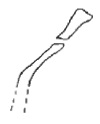 |
| Figure 658. Chamaepsila bicolor, pregenital sclerites in ventral view |
 |
| Figure 659. Chamaepsila ephippium, epandrium and paramere ventral view |
 |
| Figure 660. Chamaepsila martineki, epandrium in ventrolateral view |
 |
| Figure 661. Chamaepsila martineki, anterior part of mesonotum |
 |
| Figure 662. Chamaepsila martineki, paramere in ventral view |
 |
| Figure 663. Chamaepsila martineki, pregenital sclerites in ventral view |
 |
| Figure 664. Chamaepsila pseudobicolor, epandrium and paramere in ventral view |
 |
| Figure 665. Chamaepsila quadrilineata, epandrium in ventrolateral view |
 |
| Figure 666. Chamaepsila quadrilineata, paramere in ventral view |
 |
| Figure 667. Chamaepsila quadrilineata, pregenital sclerites in ventral view |
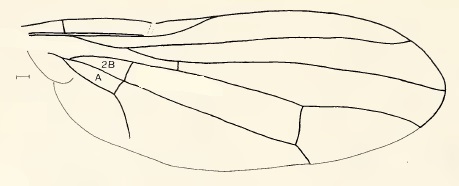 |
| Figure 668. Chamaepsila rosae, wing |
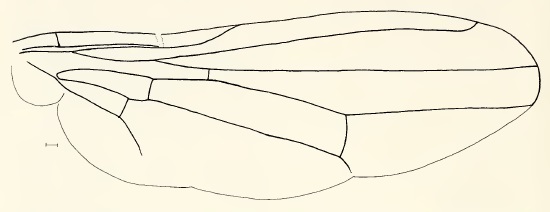 |
| Figure 669. Chyliza scutellata, wing |
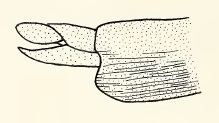 |
| Figure 670. Psilosoma audouini, ovipositor in lateral view |
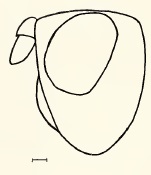 |
| Figure 671. Chamaepsila pallida, head in lateral view |
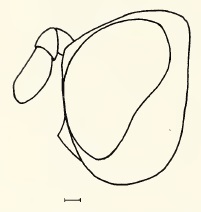 |
| Figure 672. Chyliza vittata, head in lateral view |
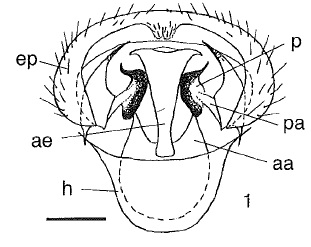 |
| Figure 673. Chamaepsila confusa, male genitalia in ventral view |
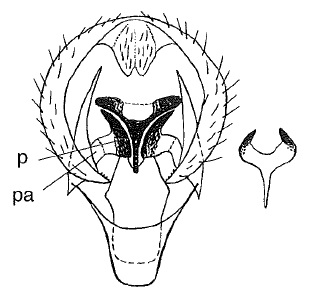 |
| Figure 674. Chamaepsila persimilis, male genitalia in ventral view |
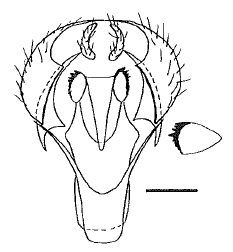 |
| Figure 675. Chamaepsila unilineata, male genitalia in ventral view |
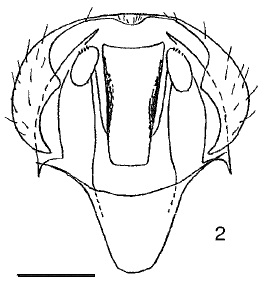 |
| Figure 676. Chamaepsila pallida, male genitalia in ventral view (Switzerland) |
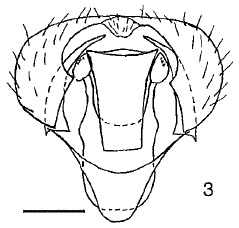 |
| Figure 677. Chamaepsila pallida, male genitalia in ventral view (Russia) |
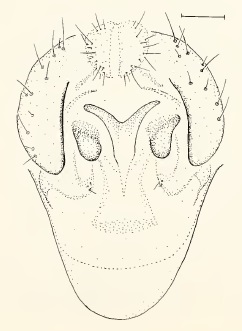 |
| Figure 678. Chamaepsila obscuritarsis, male genitalia in ventral view |
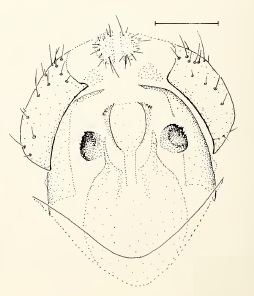 |
| Figure 680. Chamaepsila luteola, male genitalia in ventral view |
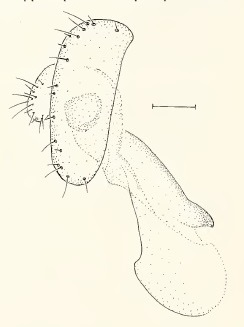 |
| Figure 682. Chamaepsila obscuritarsis, male genitalia in lateral view |
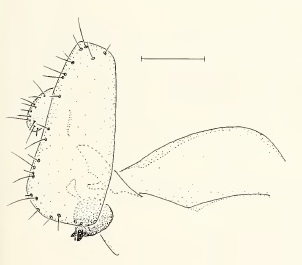 |
| Figure 683. Chamaepsila luteola, male genitalia in lateral view |
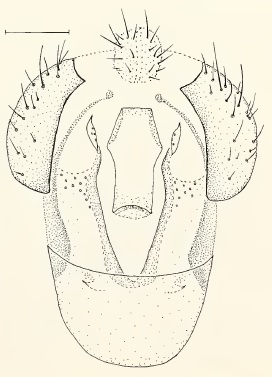 |
| Figure 684. Chamaepsila buccata, male genitalia in ventral view |
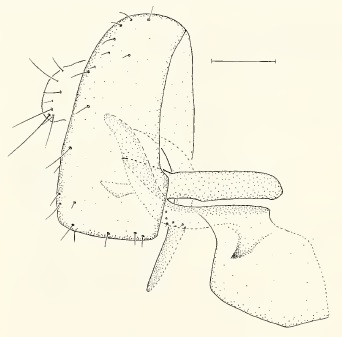 |
| Figure 685. Chamaepsila buccata, male genitalia in lateral view |
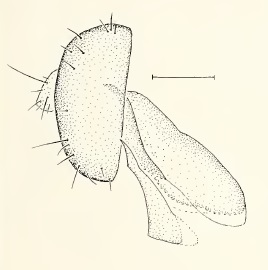 |
| Figure 686. Chamaepsila atra, male genitalia in lateral view |
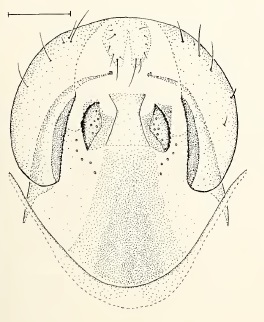 |
| Figure 687. Chamaepsila atra, male genitalia in ventral view |
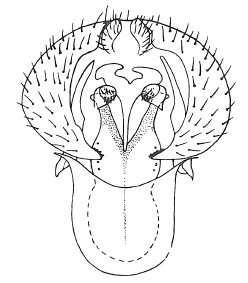 |
| Figure 688. Chamaepsila persimilis, male genitalia in ventral view |
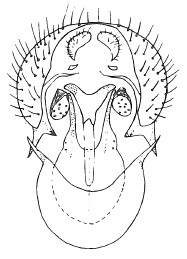 |
| Figure 689. Chamaepsila nigricornis, male genitalia in ventral view |
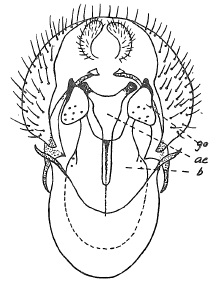 |
| Figure 690. Chamaepsila rosae, male genitalia in ventral view |
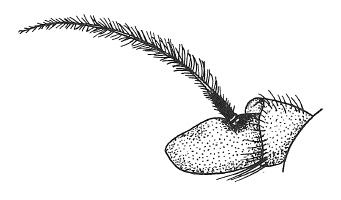 |
| Figure 691. Psila fimetaria, antenna |
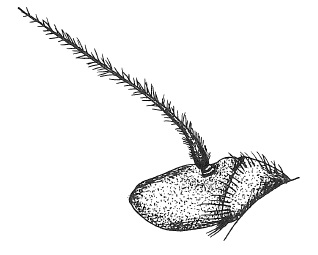 |
| Figure 692. Psila merdaria, antenna |
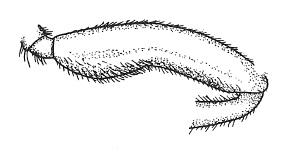 |
| Figure 693. Psilosoma lefebvrei, male hind femur |
 |
| Figure 694. Chamaepsila unilineata, arista |
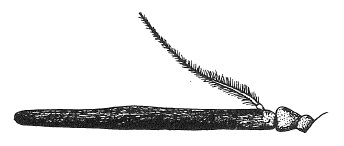 |
| Figure 695. Imantimyia albiseta, antenna |
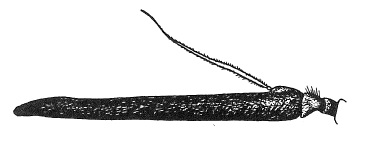 |
| Figure 696. Imantimyia sylvatica, antenna |
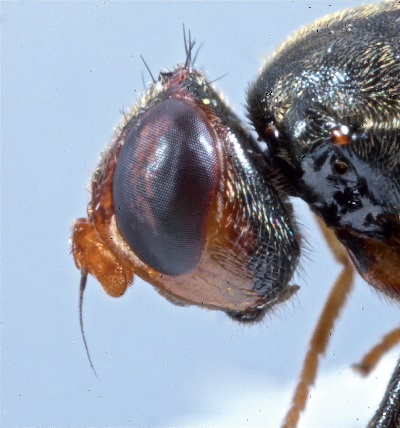 |
| Figure 697. Chyliza leguminicola, head in lateral view |
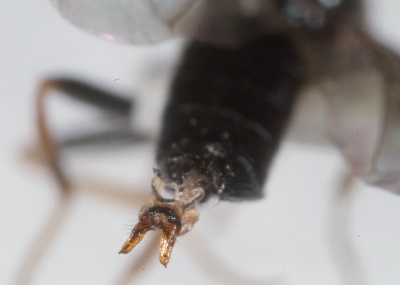 |
| Figure 698. Chyliza leguminicola, male genitalia |
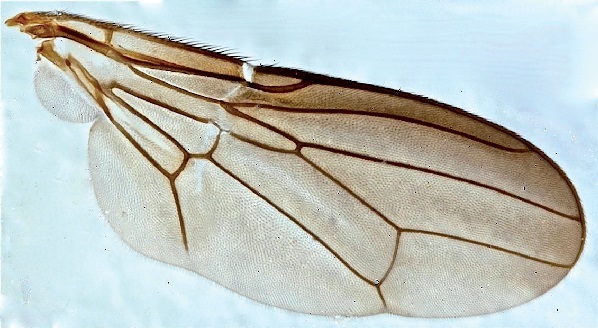 |
| Figure 699. Chyliza leguminicola, wing |
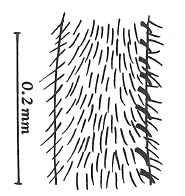 |
| Figure 700. Chyliza leptogaster, male fore tibia |
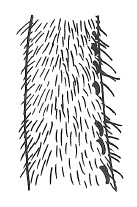 |
| Figure 701. Chyliza nova, male fore tibia |
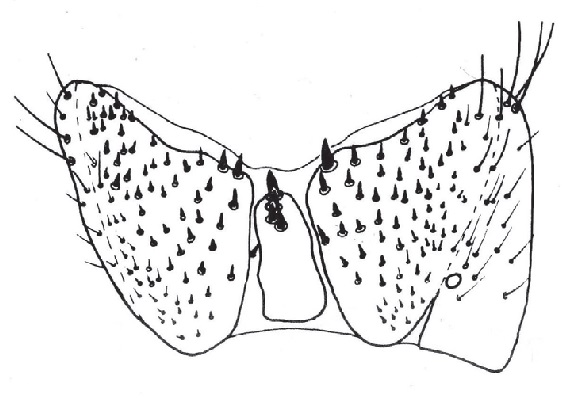 |
| Figure 702. Chyliza leptogaster, male sternite 6 |
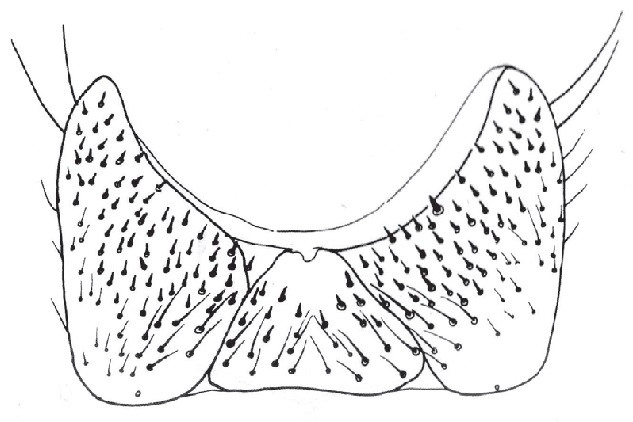 |
| Figure 703. Chyliza nova, male sternite 6 |
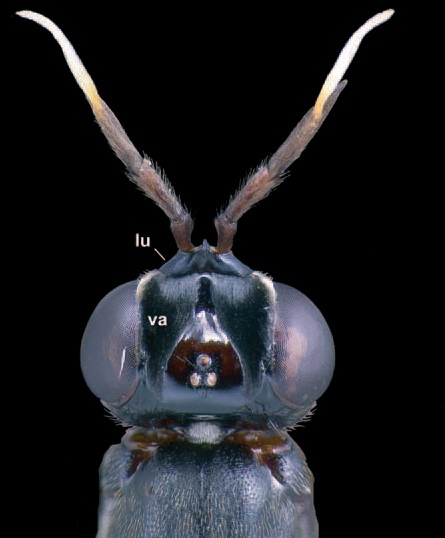 |
| Figure 704. Loxocera (Platystyla) hoffmannseggi, head in dorsal view |
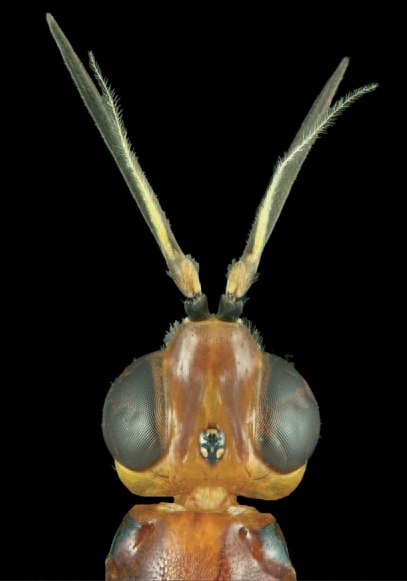 |
| Figure 705. Imantimyia ignyodactyla, head in dorsal view |
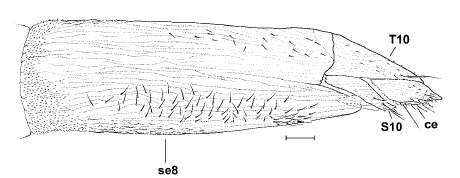 |
| Figure 706. Loxocera (Loxocera) aristata, ovipositor in lateral view |
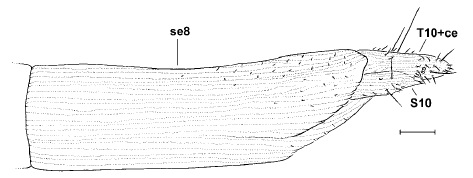 |
| Figure 707. Imantimyia albiseta, ovipositor in lateral view |
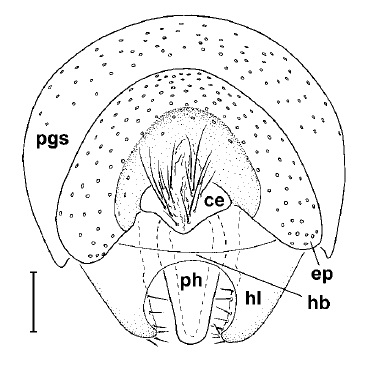 |
| Figure 708. Loxocera (Loxocera) aristata, male genitalia in caudal view |
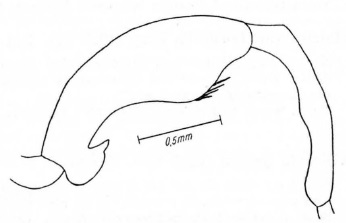 |
| Figure 709. Psilosoma audouini, male hind femur |
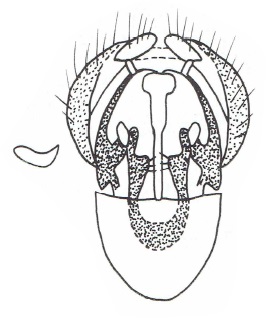 |
| Figure 710. Chamaepsila rozkosnyi, male genitalia in ventral view |
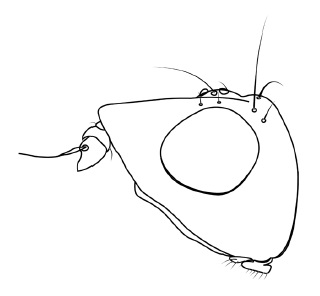 |
| Figure 711. Chamaepsila hebraica, head in lateral view (long) |
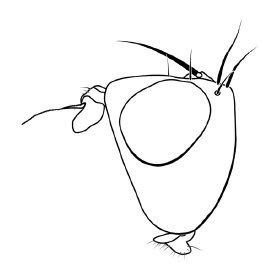 |
| Figure 712. Chamaepsila hebraica, head in lateral view (short) |
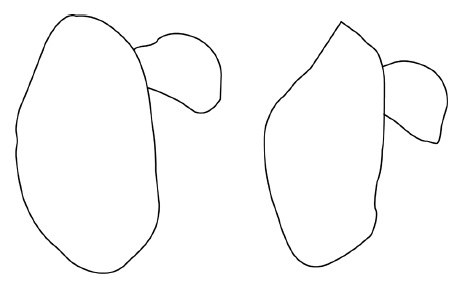 |
| Figure 713. Chamaepsila hebraica, genitalia in lateral view |
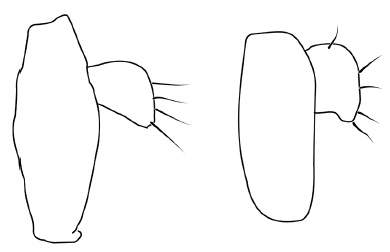 |
| Figure 714. Chamaepsila homochroa, genitalia in lateral view |
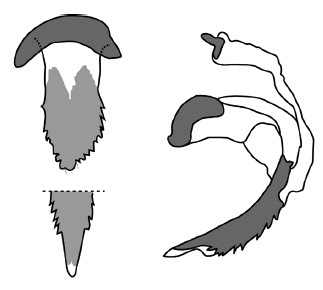 |
| Figure 715. Chamaepsila friedmani, phallus |
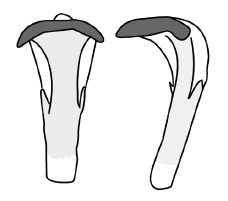 |
| Figure 716. Chamaepsila hebraica, phallus |





















































































































